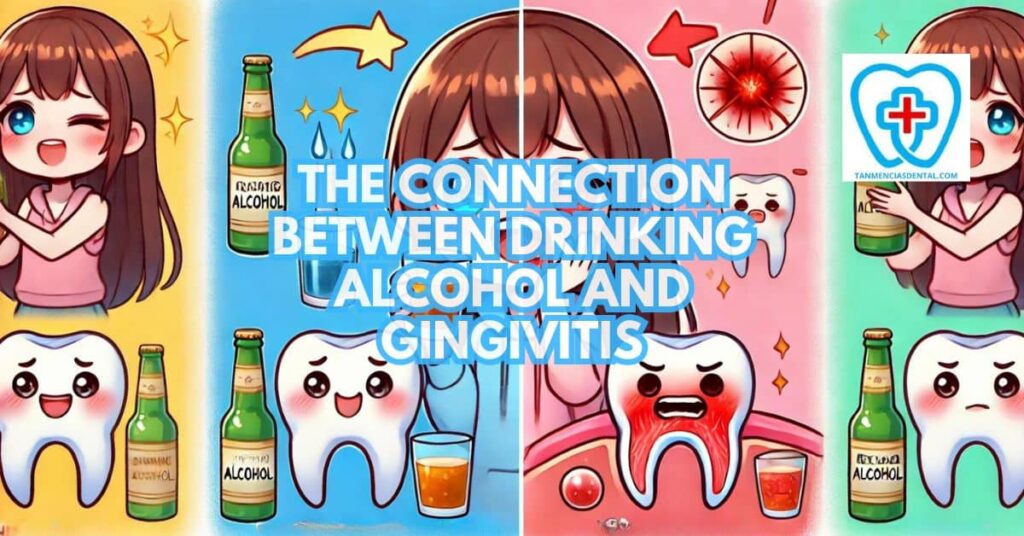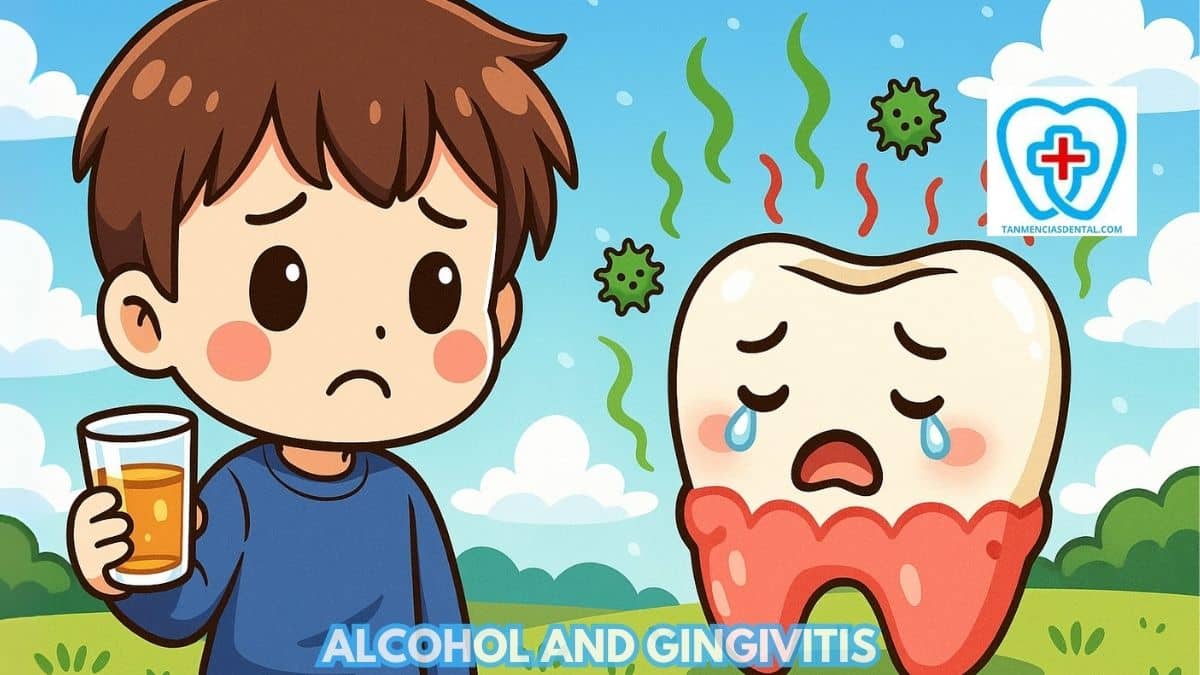Alcohol and gingivitis are closely linked, and understanding this connection can help protect oral health.
Drinking alcohol affects the gums in many ways, including reducing saliva, weakening the immune system, and increasing plaque.
These effects make the gums more likely to become inflamed, bleed, or recede over time.
Alcoholic drinks with high sugar or acid also create conditions that allow bacteria to thrive and damage gum tissue.
By learning how alcohol contributes to gingivitis, people can take steps to lower their risk and keep their gums healthy.
1. Gingivitis: A Primer
Gingivitis starts when plaque, a sticky mix of germs, builds up along the gumline and irritates the tissue.
Common signs include red and puffy gums that bleed when you brush or floss, and bad breath that does not go away.
If it is not treated, the inflammation can spread deeper and become periodontal disease that harms the ligaments and bone that hold teeth.
The advanced form of periodontal disease is periodontitis, which creates deep pockets around teeth where bacteria collect.
These pockets make cleaning hard, increase swelling and bleeding, and raise the risk of loose teeth or tooth loss.
Daily care helps most: brush for two minutes twice a day, floss once a day, use fluoride toothpaste, and get regular dental cleanings to remove tartar that brushes cannot.
Early checkups let a dentist diagnose gingivitis and set a simple plan so the gums can heal before they turn into periodontitis.
🦷 Can Periodontal Gum Disease Be Reversed?
2. Alcohol: A Surprising Risk Factor for Gum Disease
Many people are unaware that alcohol consumption is a significant risk factor for gum disease.
Alcohol can irritate and inflame the gums, making them more susceptible to infection.
Frequent alcohol intake can disrupt the natural balance of bacteria in the mouth, promoting harmful bacterial growth.
Additionally, the sugar content in many alcoholic beverages can contribute to plaque buildup.
Understanding these risks highlights the importance of moderating alcohol consumption to maintain healthy gums.
🦷 Basic Dental Care Vs Routine Dental Care: What’s the Difference?
3. Dry Mouth: The Silent Threat to Your Gums
Alcohol often leads to dry mouth, a condition where saliva production is reduced.
Saliva plays a crucial role in keeping the mouth clean by washing away food particles and bacteria.
Without enough saliva, bacteria can accumulate and cause gum inflammation.
Dry mouth can also make it uncomfortable to eat and speak, affecting the overall quality of life.
Drinking water and using saliva substitutes can help mitigate the effects of dry mouth and protect gum health.
🦷 Can Children Use Electric Toothbrushes? Is It Safe and Effective for Them?
4. Alcohol’s Impact on Your Immune System
Alcohol consumption can weaken the immune system, making it harder for the body to fight off infections.
When the immune system is compromised, the gums become more susceptible to bacterial infections and inflammation.
This increased vulnerability can lead to the development and progression of gingivitis.
A weakened immune response can also slow down the healing process of existing gum disease.
Reducing alcohol intake can help maintain a stronger immune system, better protecting your gums from infection.
🦷 How to Treat Gingivitis in Toddlers: A Parent’s Guide

5. How Alcohol Promotes Plaque Buildup
Many alcoholic drinks, especially those high in sugar, add to plaque buildup on the teeth and gums.
Plaque is a sticky layer of bacteria that clings to the surfaces of teeth and can be difficult to remove without daily brushing and flossing.
If plaque is left alone, it can harden into tartar, which irritates gum tissue and increases the risk of gingivitis.
The acids found in drinks like wine, beer, and mixed cocktails can weaken enamel, which not only helps plaque stick but also raises the chance of tooth decay.
When enamel becomes thin, bacteria can enter more easily and cause both cavities and gum problems at the same time.
Keeping up with regular brushing, flossing, and professional dental cleanings is essential to control plaque and lower the risks of gingivitis and tooth decay.
🦷 How Sedation Dentist Procedures Help Patients Overcome Dental Anxiety
6. How Nighttime Drinking Habits Raise the Risk of Gingivitis
Drinking a lot in a short time or late at night often leads to skipping brushing and flossing.
People may fall asleep with sugar and acid from drinks still on their teeth and gums.
These leftovers feed bacteria and raise plaque by morning.
Late drinks also go with extra snacks, which add more food for bacteria.
Brushing before bed, rinsing with water, and planning alcohol free nights can lower this risk.
🦷 How to Keep Your Teeth Clean With Braces: A Helpful Guide
7. Alcohol and Oral Bacteria: A Harmful Relationship
Alcohol can upset the natural balance of bacteria in the mouth and allow harmful germs to grow more easily.
These harmful bacteria produce toxins that irritate the gums and increase the risk of gingivitis and other oral infections.
At the same time, the number of helpful bacteria that normally protect the mouth may decrease, leaving the gums more vulnerable.
For a regular drinker, this imbalance can become more severe, leading to ongoing irritation, swelling, and bleeding of the gums.
The longer this pattern continues, the greater the chance that existing gum problems will worsen and new ones will appear.
Brushing, flossing, and limiting alcohol use are important steps for keeping the balance of bacteria in the mouth healthy and lowering the risks linked to drinking.
🦷 Should I Brush My Teeth Before Using Whitening Strips?
8. Gum Recession: Another Side Effect of Excessive Drinking
Excessive alcohol consumption can lead to gum recession, where the gums pull away from the teeth.
This condition exposes the roots of the teeth, making them more susceptible to decay and sensitivity.
Receding gums can create pockets where bacteria can accumulate, increasing the risk of infection and gingivitis.
Gum recession can also affect the appearance of your smile, causing your teeth to look longer.
Reducing alcohol intake and practicing good dental care can help prevent gum recession and protect overall oral health.
🦷 Do You Brush Your Teeth After Whitening? Find Out!
9. Alcohol and Tooth Erosion: Indirect Impact on Gum Health
Alcoholic beverages, especially those with high acidity, can erode tooth enamel over time.
Tooth erosion weakens the enamel, making teeth more vulnerable to decay and cavities.
When enamel is compromised, bacteria can more easily penetrate the teeth and gums, leading to infections and gingivitis.
The indirect impact of alcohol-induced tooth erosion can thus significantly affect gum health.
To mitigate these effects, it is essential to consume alcohol in moderation and maintain a rigorous oral hygiene routine.
🦷 Bad Taste in Mouth Even After Brushing Teeth: What’s Going On?
10. Moderation is Key: Alcohol and Gum Health
Moderation in alcohol consumption is crucial for maintaining healthy gums.
Excessive drinking can lead to a host of oral health problems, including gingivitis, dry mouth, and gum recession.
By limiting alcohol intake, you can reduce these risks and protect your gums from inflammation and disease.
Incorporating alcohol-free days into your week can give your mouth a chance to recover and stay healthy.
Remember, the goal is to balance enjoying alcohol with preserving your oral health.
🦷 Endodontic And Periodontal Treatment in Marikina
11. Protecting Your Smile: Tips for Reducing the Risk
To protect your gums from the harmful effects of alcohol, adopt good oral hygiene habits.
Brush your teeth twice daily with fluoride toothpaste and floss regularly to remove plaque.
Stay hydrated by drinking plenty of water, which helps wash away food particles and bacteria.
Schedule regular dental checkups to monitor your gum health and catch any issues early.
Reducing alcohol consumption and maintaining these habits can significantly lower your risk of developing gingivitis.
🦷 Family Dentistry in Marikina
👨⚕️ Conclusion
Understanding the connection between alcohol and gingivitis empowers you to make better choices for your oral health.
By moderating alcohol intake and practicing good dental hygiene, you can protect your gums from inflammation and disease.
Regular dental visits and being mindful of your drinking habits are key to maintaining a healthy smile.
Taking proactive steps today can prevent the harmful effects of alcohol on your gums.
Prioritizing your oral health ensures a lifetime of strong, healthy gums.
😊 Self-Promotion
Visit Tan-Mencias Dental Clinic in Parang, Marikina City, for top-notch dental care with a smile!
Our friendly team is dedicated to making your visit comfortable and stress-free.
For any questions or concerns, feel free to call us at 9171451074.
You can also reach out through our Facebook page or send a message via our website’s contact form.
We look forward to helping you achieve a healthy, beautiful smile!
❔ FAQs
1. Does drinking alcohol cause gingivitis?
Alcohol does not cause gingivitis by itself, but it makes the mouth more likely to get it.
It dries the mouth, feeds plaque, and weakens the immune system.
These changes let bacteria irritate the gums and make them bleed and swell.
2. Which alcoholic drinks are hardest on gum health?
Drinks with lots of sugar or acid are most harmful.
Sweet cocktails, mixed drinks, and soda mixers leave more sugar on teeth.
Wine and many spirits with citrus are acidic, which helps plaque stick and irritates gums.
3. What can I do after drinking to protect my gums?
Rinse with water right away and wait 30 minutes before brushing to protect weakened enamel.
Brush and floss before bed and clean the tongue.
Drink water between drinks and have alcohol free nights each week.
4. Are alcohol based mouth rinses good if I have gingivitis?
Some can help control plaque, but they may sting and can worsen dry mouth.
If your gums are sore or your mouth feels dry, choose an alcohol free rinse with fluoride or CPC.
Ask your dentist which rinse is best for you.
5. When should I see a dentist about my gums if I drink often?
See a dentist if your gums bleed, look red or swollen, or if you notice bad breath that does not go away.
Get a checkup at least twice a year, or more often if you have gingivitis.
Early care can reverse gingivitis and protect your gums.

